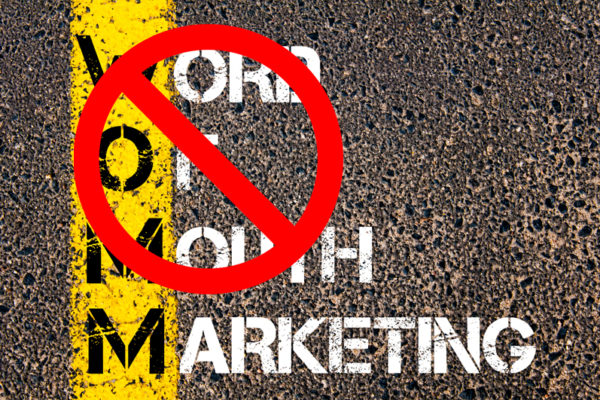Why good word-of-mouth isn’t enough to support your business.
“I get most of my new business through word-of-mouth.” Many small business owners say this with pride. But is this good or bad? I submit that it’s both.
First, let’s assume it’s true. Let’s assume that you actually measure the amount of new business you get every month and you’re able to identify how these first-timers are hearing of you and what prompted them to give you a try. Then, let’s assume this shows most of your first-time customers are in fact being referred to you by friends, family, or better still, other customers of yours. On one level, this is great. It suggests that your products & pricing, and most importantly, your customer experience, are so exceptional that your customers are not only telling others about you, but also convincing them to proactively contact you. If that’s the case, you and your team should take a bow.
Now, think of how often you do this for somebody else. Once, twice, maybe half-a-dozen times a year? No doubt, it’s for only a few of the many businesses you interact with over time. Then imagine most of your customers are just like you. (It’s usually dangerous in business to assume that one’s customers are like oneself, but in this case you’re probably safe). What are the odds that your business is the one mentioned by more than a small handful of your biggest fans?
Finally, compare the number of new customers you’ve gotten in the last month to the number of existing repeat customers you already have. If you’ve been around more than a couple of years, and again, if you’re actually able to measure this, you know that it’s a small proportion. Like most businesses, the bulk of your sales comes from a core of loyal repeat customers who are the foundation of your enterprise.
What’s the conclusion? While getting the bulk of your new business via word of mouth can be a positive indicator that you’re doing lots of things right, the extent to which it’s actually happening and its impact on your overall business is probably smaller than you think.
If the bulk of your new business is being driven by a fraction of your existing customers through a process over which you have no control (think about that), you’re clearly not doing enough to assure the survival of your business, let alone grow it to any appreciable degree. If relying on word-of-mouth to generate new business is the extent of your marketing strategy, you really don’t have one. Your marketing is on auto-pilot, and if your business is growing, there’s probably another, more important explanation. If it’s not growing, this could be one good reason why.
Talk with us about no-cost/low-cost marketing strategies that will take you beyond “word of myth” to where you, and not your customers, are in control of your marketing, your message, and your ultimate success.


